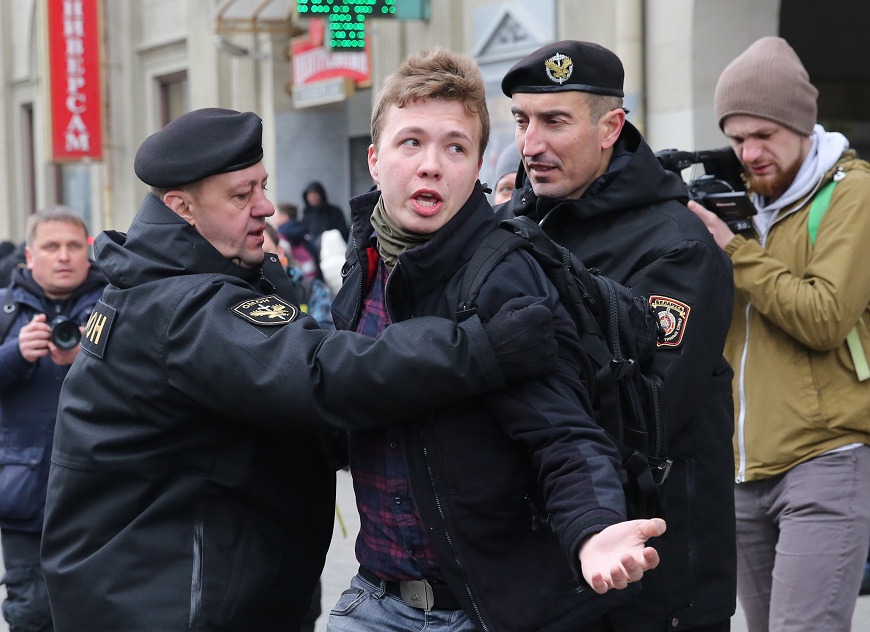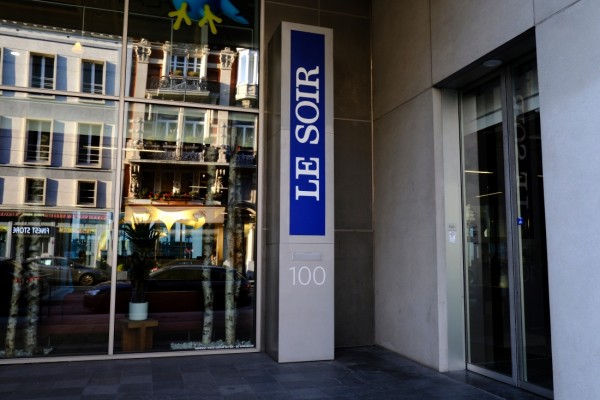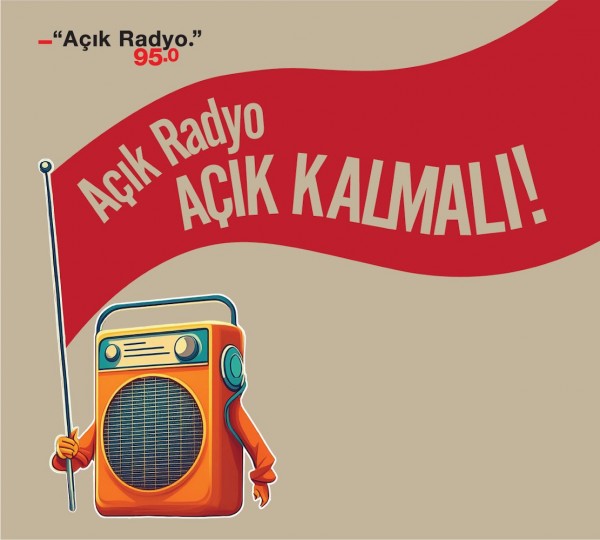In just over a month in Belarus, which is well-known for muzzling free speech and harassing independent media, the popular independent website Charter ’97 was blocked, a Belsat TV cameraman was beaten by police and a reporter had his home searched following an article on police brutality.
These, however, are but some of the latest cases in a year marked by a radical worsening in Belarus’s press freedom situation.
In 2016, it seemed that Belarusian authorities had eased up on harassing journalists. Comparatively few reporters were fined, arrested or subjected to violence that year.
Then came spring 2017.
Around that time, President Aleksandar Lukashenka introduced a tax on those who are not employed full-time in an attempt to boost the country’s faltering, Soviet-era economy. Rarely seen anti-government protests filled streets and town squares across the country. As part of an attempt to quell the effect of the protests, authorities launched a media crackdown.
101 journalists were detained in 2017, according to the Belarusian Association of Journalists (BAJ), most of them during protests in March and April. 69 journalists were fined for working “illegally” in 2017, more than in the years 2014 to 2016 combined.
Many of those detained or fined were freelancers working for the Polish-funded independent television channel Belsat TV.
“Our journalists became prey for the Belarusian authorities”, Agnieszka Romaszewska-Guzy, the director of Belsat TV, told the International Press Institute (IPI) in a recent interview.
The situation is not getting any easier. Since the beginning of 2018, Belsat TV has already been involved in 10 legal proceedings in Belarus, Romaszewska said.
Freelancers constantly targeted
The everyday life of independent journalists in Belarus is full of obstacles. The most notable ones, Belarusian journalists say, are an “absurd” mass media law, a biased judicial system and the repressive regime of President Lukashenka, who has ruled the country with an iron fist since 1994. Add in the generalized crisis of the newspaper industry and decreasing enthusiasm from Western partners to fund independent media in Belarus and one can understand why Belarusian journalists do not entertain high hopes for a quick fix in the media situation.
Televisions remains the main source of news in Belarus. Nine basic channels are provided free to the public. This set is limited to state-owned TV channels, which follow the line of the Lukashenka regime, and Russian networks that concentrate on getting the Russian view through to Belarusians.
“According to our previous minister of information, journalists who work for state-owned media are state officials”, Michal Janczuk, deputy chair of the BAJ, said in an interview with IPI. “This describes the position of Belarusian journalists in state-controlled media.”
The only independent TV channel in Belarus is the satellite and online broadcaster Belsat TV, which is funded and operated from Poland. While Belsat TV’s reporting is mainly done in Belarus, the material is edited in Poland and broadcast back to Belarus.
Foreign-based media targeting a Belarusian audience are extremely important for the country, Janczuk, who is himself a former Belsat TV journalist, emphasized.
“Belsat TV is the only alternative to Minsk and Kremlin propaganda [in television]”, he said. “Foreign-based media are free to write about anything they want, as openly as they want.”
Established as a joint project of Poland’s Ministry of Foreign Affairs and the Polish public broadcaster TVP in 2007, the channel has faced numerous challenges in Belarus. A major problem is that Belarus’s media law does not recognize freelancers cooperating with foreign mass media as journalists. Most of Belsat TV’s journalists in Belarus are freelancers and are systematically denied accreditation by the authorities. Journalists who are caught working for foreign-based media without accreditation can be fined or detained for ”illegal production and distribution of mass media”. State institutions – which are not especially transparent to begin with – also routinely refuse to provide information to non-accredited journalists.
Media advocates, including the Office of the Representative on Freedom of the Media of the Organization for Security and Co-operation in Europe (OSCE), have repeatedly called for a legal reform. “Freelance journalists should be able to work as freely as journalists employed with registered media outlets”, the Representative said in a 2014 statement on Belarus.
Belsat TV also faces the “absurd” conundrum that Belarusian law bars accrediting journalists who have previously worked without authorization.
“In Belarus, you can’t get accreditation if you have been punished before”, Romaszewska explains. “And since almost all our journalists have been punished for working without accreditation, they can’t get it. So it is a vicious circle.”
The fines for working without accreditation amount to around 300 to 400 euros per case. BAJ pays the fines for its members, who are mainly independent journalists working outside of state media.
“Last year we paid almost 30,000 euros worth of fines in total”, Janczuk said. “Already in 2018, we have almost reached 3,000 euros, which is radically more than last year this time.”
The BAJ faces its own challenges. The association’s membership cards are no longer accepted as press cards. Its legal department is now barred from helping journalists in court, restricting it to providing informal support to journalists in legal trouble. Still, with around 1,200 members, the BAJ is financially sustainable and has the means to clout to stand up for journalists’ rights, making it an invaluble voice in Belarus’s media landscape.
In addition to the BAJ, there is a journalists’ union for state-owned media workers in Belarus. Despite several attempts to build dialogue between the two associations, including with help from European partners, the journalistic community in Belarus remains deeply divided.
“Whenever we have meetings outside the country, they (union members) stand for dialogue and media reform”, Janczuk said. ”But when they get back to their desks in Belarus, they go back to propaganda reporting.”
Self-censoring allows moderate critique
There are a few strong commercial non-state media outlets in Belarus. Though they are powerful players against the lavishly funded government sources, their ability to report critically has limits.
For example, the most popular news portal in Belarus, Tut.by, is perceived as “quite honest” in its reporting. But it remains dependant on advertising money, which can lead to self-censorship and extra caution.
“If there is a scandal, Tut.by usually waits a couple of days before it publishes the news, so it won’t be the first one”, Janczuk noted.
The owner of Tut.by, Yuri Zisser, said in an interview with Journalisti, a publication of the Union of Journalists in Finland, that authorities tolerate the site’s moderately critical coverage because they know readers would turn to the more radical, foreign-based sources if Tut.by were not allowed to operate. This tolerance, however, does not fully protect Tut.by’s journalists, who have also been threatened and assaulted by the police.
Apart from the big commercial actors, there are a few smaller, independent media outlets operating from inside Belarus as well. Romaszewska described these media outlets as doing a good job, but said they cannot avoid ”strange relations” with state authorities and reach a smaller audience than the more popular foreign-based independent media sources.
If there is one positive thing to be said about the media situation in Belarus in 2017, it would be the return of several independent print newspapers to state-owned newsstands. Almost 20 newspapers were excluded from state-owned press distribution networks just before presidential elections 11 years ago. Many of the papers stopped publishing in printed format.
Their successful return is attributed to a meeting between Lukashenka and the editor-in-chief of the pro-opposition newspaper Narodnaya Vola in February 2017. Distribution networks are once again cooperating with both Narodnaya Vola and Nasha Niva, the country’s leading opposition print publications.
Blocking of dissent voices: Charter’97
Apart from Belsat TV, the other main source of independent news for Belarusians is the Poland-based news website Charter’97, which is critical of the Lukashenka regime.
The fact that Charter’97 is a website is no accident: In Belarus, where most of the press and broadcasting sector is state-owned, the online sphere has long been on the frontlines of the battle for free expression – something not lost on the Belarusian authorities. On January 24, 2018, Belarus blocked access to Charter ’97. The Ministry of Information has not provided a specific reason for the blocking except to state that Charter’97 had violated Belarusian mass media law.
Belarus began regularly blocking access to critical websites in 2015, issuing more than 190 decisions on web blocking since then.
Media observers say that blocking not only restricts the public’s access to a certain site, it can also trigger a change in the site’s editorial line. For example, authorities blocked the independent news portal Belarusian Partisan in December 2017. The site is now operating again from a Belarusian domain, but is visibly less radical in its reporting than before.
“They don’t say it, of course, but we can see it”, Janczuk said.
Natallia Radzina, the editor-in-chief of Charter’97, told IPI in an interview that the blocking is a sign that the Belarusian government is afraid of the site’s popularity. More than two million individual users visit the site each month, Radzina said.
Charter’97 is now trying to provide its readers with different ways to work around the block. However, the blocking has caused a 70 to 75 percent drop in Belarusian readership of the site.
Radzina described the blocking of critical and independent media such as Charter’97 as a dangerous move, since these outlets fight Kremlin propaganda in Belarus.
“Million of readers are now unable to get independent, uncensored information”, she said.
Free news a day keeps the Kremlin away
Independent media outlets take pride in fighting what they call Kremlin propaganda, which already dominates the Belarusian media landscape. Belarus relies heavily on Russia both economically and politically, but the war in Ukraine and other disputes have shaken their relationship.
In response, Russia has revved up its media machine to ensure Belarus keeps its distance to the West. Whenever Lukashenka takes a step towards EU, the machine reacts. The state live-censors Russian media, sending advertisements in the place of ”inconvenient” Russian news, but state media cannot openly criticize Russia as the ties between the countries are too tight.
That is one of the reasons Lukashenka has not crushed independent media completely, Romaszewska said. Belarusian officials know that without the existence of uncensored media, there is no real counterforce to Russian influence.
“I think we get even a little bit of sympathy from certain authorities”, Romaszewska commented. “We are doing for them the work they cannot do.”
Both Belsat TV and Charter’97 are based in Poland, which has traditionally been an advocate for democracy and press freedom in post-Soviet states, especially Belarus. Romaszewska believes the reason is simple: Poland does not want Russia on its borders.
However, Poland, a longtime friend of the Belarusian democratic opposition, has slightly changed course in recent years. Notably, the current Polish government, led by the conservative Law and Justice (PiS) party, has drawn widespread criticism for its attacks on the judiciary and independent media in Poland since taking power in 2015.
Janczuk described the change in Poland’s Belarus media strategy as a “pragmatic” shift.
“Poland sees that the democratic opposition is weak in Belarus, and that there are no fast changes in sight with regards to that”, he explained. “The current (Polish) government is more interested in economic relations with Belarus. This is why Poland wants to build a relationship with the Belarusian government instead of the opposition.”
The shift became apparent in January 2017, when the biggest funder of Belsat TV, the Polish Ministry of Foreign Affairs (MFA), said it would stop funding the broadcaster. For a moment, the future of Belsat TV looked dark.
“There was a very serious threat of closing Belsat TV”, Romaszewska told IPI. “The government of (former PiS Prime Minister) Beata Szydło wanted to break (with) the old policy of helping free speech in the East. They wanted to talk to Lukashenka, and that was their main goal.”
In December 2017, Poland saw a new prime minister and a new foreign minister take office as part of a cabinet reshuffle. Shortly thereafter, the Polish Parliament added funding for Belsat TV to the state budget. With that, the broadcaster’s financial situation is secure, at least until the next parliamentary elections. Belsat TV is also examining the possibility of receiving financial help from the United Kingdom.
Poland’s new deputy foreign minister even condemned the attack on a Belsat cameraman in February.
“The previous government was completely indifferent to these kinds of things”, Romaszewska said. “Now the deputy minister reacted, and the extent of the support was really a surprise to me.”
In Radzina’s view, Western countries should deal firmly with Belarus on the blockings and harassment of journalists. If Belarus does not allow media to operate freely, it should be sanctioned, she said, arguing that a strong response would also be in Europe’s best interest.
“If the blocking of Charter’97 is not condemned strongly enough, it can result in other blockings as well, which opens the field to even more Russian propaganda”, she explained.
Janczuk and Radzina both emphasized that a lack of free media in Belarus would make it possible for Kremlin views to dominate the whole of the country’s media landscape. And they fear the next step could be even worse.
“If we allow Kremlin propaganda to completely take over, Belarus could be the next Donbass and lose its independence”, Janczuk warned.
“In some parts of the country, the Russian-speaking population is already under Kremlin influence. According to polls, 62 percent of Belarusians see the occupation of Crimea as historical justice. This is the result of Kremlin propaganda.”
These prospects have not gone unnoticed in the European Parliament. Ramon Luis Valcárcel, one of the Parliament’s vice presidents, recently sent a letter to European Commission over the Charter’97 blocking. While acknowledging the ”fragility” of relations between the EU and Belarus, Valcárcel urged the bloc to respond firmly.
Valcárcel ended his letter with words that reflect the worst fears of Belarus’s journalists.
“I am convinced that if we do not defend press freedom today, a time may come when there will be no other freedom left to defend in Belarus”, he wrote.



